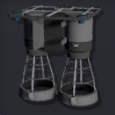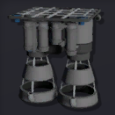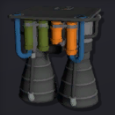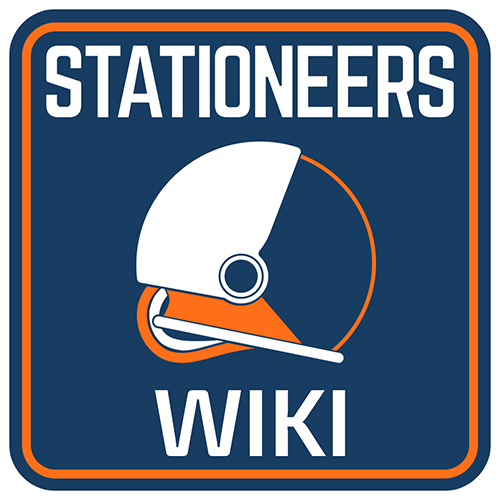Kit (Pumped Liquid Engine)
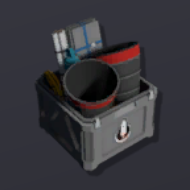 |
| Fabrication
|
|---|
| Created with |
Rocket Manufactory (Tier One) |
|---|
| Cost |
60000 Energy, 15g Steel, 5g Electrum, 10g Constantan |
|---|
|
|
|---|
| Temperature
|
|---|
| Flashpoint |
373K (100°C) |
|---|
| Autoignition |
573K (300°C) |
|---|
|
|
|---|
| Other properties
|
|---|
| Paintable |
Yes |
|---|
| Stack Size |
1 |
|---|
|
|
|---|
| Prefabs
|
|---|
| Prefab Hash |
1921918951 |
|---|
| Prefab Name |
ItemKitPumpedLiquidEngine |
|---|
|
|
|---|
Pumped Liquid Engine
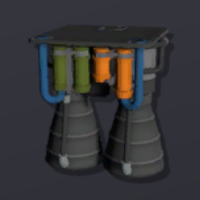 |
| Operation
|
|---|
| Base Power Usage |
200W |
|---|
| Rocket Mass Contribution |
500kg |
|---|
| Max Thrust |
17,6kN |
|---|
| Efficiency |
140% |
|---|
| Exhaust Velocity |
5,47km/s (Isp: 559s) |
|---|
|
|
|---|
| Contruction
|
|---|
| Total cost |
2,5g Iron, 17g Steel, 5g Electrum, 10g Constantan |
|---|
| Constructed from |
Kit (Pumped Liquid Engine) |
|---|
|
|
|---|
| Other properties
|
|---|
| Paintable |
Yes |
|---|
|
|
|---|
| Prefabs
|
|---|
| Prefab Hash |
-23091440019 |
|---|
| Prefab Name |
StructurePumpedLiquidEngine |
|---|
|
|
|---|
Description[edit]
"Liquid propellants bring greater efficiencies with Pumped Liquid Engine. Two inputs are provided so Stationeers can seperate their fuels, the Setting variable controls the mixing ratio of the inputs. The engine is designed to run on Liquid Volatiles and Liquid Oxygen, some Stationeers have reported excessive thrust values by switching to Liquid Nitrous Oxide."
- Stationpedia
Comparison[edit]
Rocket Engines give you their max output in kN with this you can calculate what they can reasonably carry into orbit depending on the planet or moon you are on. Force = Mass * Acceleration. Acceleration is equal to the planet's gravity, Mass is given in kg per part of the rocket, and Force is kN. If your thrust force listed below is less than the weight of the rocket in kN then you will not even take off. It is better to have a thrust much higher than the weight of the rocket or else you risk running out of fuel on launch and on landing.
Liquid propellants bring greater efficiencies. Using Nitrous Oxide as oxidizer provides excessive thrust values. Keep in mind that N2O fuel mix is 1.9375 times heavier at same moles, or 2.15 times heavier at same volume, while thrust boost is around 1.5-1.7. Engine efficiency determines "bonus" thrust multiplier, meaning engine with higher efficiency will give more thrust consuming same amount of fuel. Thus using liquid engines is more favorable if one can cool fuel down, moreover Pressure Fed Engines consume fuel inversely proportional to its temperature. On the other hand if Volatiles and Oxygen are in excess (e.g. farm on Vulcan) is may be much easier to opt for Pressure Fed Gas Engine. It will provide ~40kN at 20°C.
Data Network Properties[edit]
Click here to see/hide all the data network properties
Input Data (Write)[edit]
| Parameter Name
|
Data Type
|
Value
|
Description
|
| On
|
Boolean
|
0
|
Turns the device off.
|
| 1
|
Turns the device on.
|
| Setting
|
???
|
|
A variable setting that can be read or written, depending on the device.
|
| Throttle
|
???
|
|
Increases the rate at which the machine workes (range: 0-100)
|
| Update 0.2.4726.21691 - 19/01/2024 /Data_Network
|
Output Data (Read)[edit]
| Parameter Name
|
Data Type
|
Value
|
Description
|
| Power
|
Boolean
|
|
Can be read to return if the device is correctly powered or not, set cia the power system, return 1 if powered and 0 if not.
|
| Error
|
Boolean
|
|
1 if device is in error state, otherwise 0.
|
| Pressure
|
???
|
|
The current pressure reading of the device.
|
| Temperature
|
???
|
|
The current temperature reading of the device.
|
| Setting
|
float
|
70
|
A writable value to control the mixing Ratio percentage.
|
| RatioOxygen
|
???
|
|
The ratio of Oxygen in device atmosphere.
|
| RatioCarbonDioxide
|
???
|
|
The ratio of Carbon Dioxide in device atmosphere.
|
| RatioNitrogen
|
???
|
|
The ratio of Nitrogen in device atmosphere.
|
| RatioPollutant
|
???
|
|
The ratio of Pollutant in device atmosphere.
|
| RatioVolatiles
|
???
|
|
The ratio of Volatiles in device atmosphere.
|
| RatioVolatiles
|
???
|
|
The ratio of water in device atmosphere.
|
| Maximum
|
???
|
|
Maximum setting of the device.
|
| Ratio
|
float
|
Setting/100.0
|
read-only version of the Setting that converts from the percentage to a 0-1 fraction.
|
| Ratio
|
Boolean
|
|
The current state of the device, 0 for off, 1 for on.
|
| RequiredPower
|
???
|
|
Idle operating power quantity, does not nevessarily include extra demand power.
|
| TotalMoles
|
???
|
|
Returns the total moles of the device.
|
| RatioNitrousOxide
|
???
|
|
The ratio of Nitrous Oxide in device atmosphere.
|
| PrefabHash
|
???
|
|
The hash of the structure.
|
| Combustion
|
Boolean
|
|
The assess atmosphere is on fire. Returns 1 if atmosphere is on fire, 0 if not.
|
| Throttle
|
???
|
|
Increases the rate at which the machie works (range: 0-100)
|
| ReferenceId
|
???
|
|
Unique Reference Identifier for this object.
|
| PassedMoles
|
???
|
|
The number of moles that passed through this device on the previous simulation tick.
|
| Update 0.2.4726.21691 - 19/01/2024 /Data_Network
|
Plumbing[edit]
The most straightforward way to store fuel is to fill one tank with volatiles, and the other with oxidizer. In order to make the gasses match the display on the rocket control computer, the ingredients must be connected to the correct port on the rocket engine.
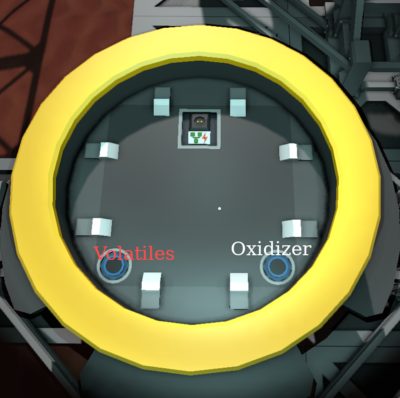
Build States[edit]
Click here to see/hide all the build states
- ↑ N2O must be much hotter to avoid condensing therefore decreasing pumping rate


